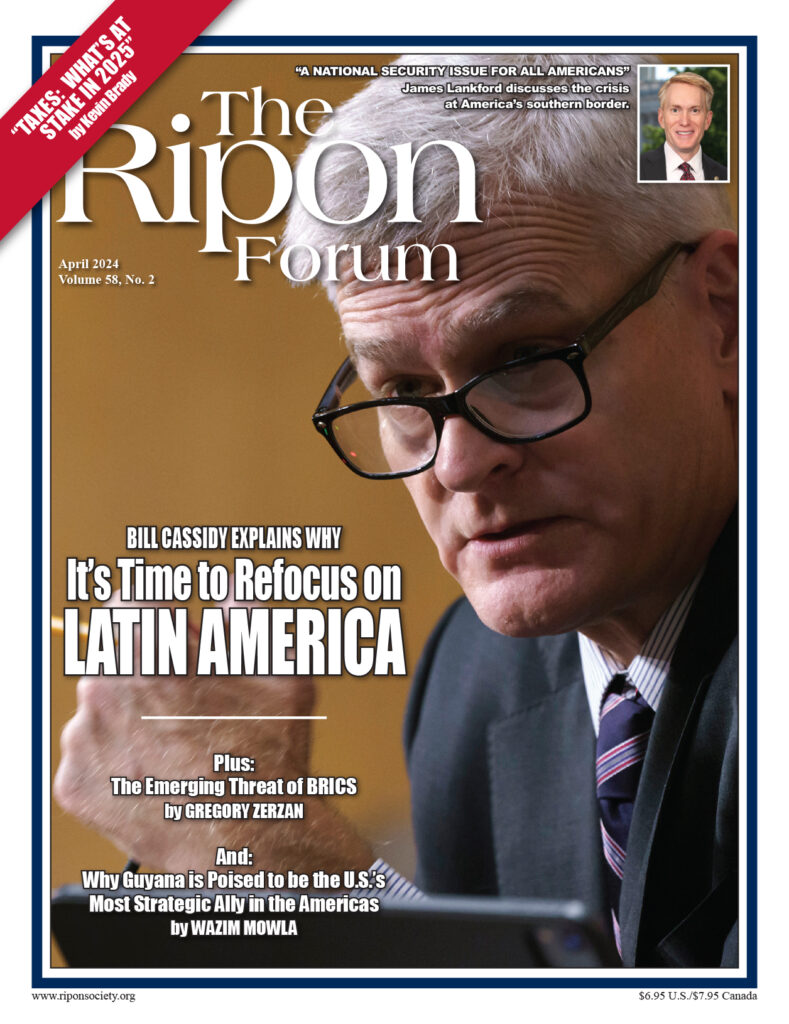In Latest Ripon Forum, Bill Cassidy Urges Congress to Counter Growing Influence of China in Western Hemisphere

WASHINGTON, DC — With Congress coming off a contentious debate that saw it approve critical aid and military assistance for key American allies around the world, one leader in the United States Senate is saying it’s time for Congress to start paying more attention to some of our key allies closer to home. The leader is U.S. Sen. Bill Cassidy (R-LA), and the allies in question are in Latin America.
Over the past two decades, the Louisiana lawmaker argues, China has been making economic and military inroads in the region. From 2000 to 2020, for example, trade between China and Latin America grew from $12 billion to $315 billion — a 26-fold increase. By 2035, this trade volume is expected to exceed $700 billion. To reverse this trend, Cassidy, along with three other lawmakers, has authored a bipartisan, bicameral plan that, he writes, “will strengthen ties across the Western Hemisphere and in so doing, confront the Chinese Communist Party’s growing global influence.” The plan is called The America’s Act. Cassidy outlines his plan in this latest edition of The Ripon Forum, and explains why it is so critical that the U.S. “create an alternative to unchecked Chinese growth” in this important part of the world.
One way that China is attempting to gain influence in Latin America and elsewhere around the globe is through its membership in BRICS, a coalition of nine nations that also includes Russia, India, Brazil, and South Africa. As former Bush Treasury official Gregory Zerzan reports in this latest edition, BRICS was established to be the equivalent of the G8 for developing counties. However, he writes: “while the G8 counts democracy, free markets, and the rule of law among its fundamental values, the BRICS feels no such obligation … The BRICS is founded on what might be deemed the Russia-China consensus, the fundamental premise of which is that the U.S. is too strong.”
One country in Latin America that is of increasing interest to both China and the United States is Guyana, where huge amounts of oil and gas have been discovered offshore. The discovery has made Guyana one of the world’s fastest growing economies and the world’s largest per capita producer of oil. While the United States currently has a good relationship with the country, Wazim Mowla of the Atlantic Council writes that U.S. engagement with the country has been “ad hoc, at best.” With Guyana on the rise and China’s influence in the region continuing to grow, Mowla argues that now is the time for Congress and the Administration to cement a bond between the two countries. “U.S. policymakers should establish a high-level economic and security dialogue with Guyana,” Mowla writes, “similar to ones the United States has with countries like Mexico, Colombia, and Guatemala, among others.” Mowla also recommends that a bipartisan congressional delegation travel to Guyana to “build lasting relationships with key political and economic influencers in the country.”
On the surface, building these kinds of relationships appears to be one of the goals of the Biden Administration. But as economist Simon A.B. Schropp writes in another essay for the Forum, this goal may be clouded by an approach to foreign relations that is uneven at best. “Common to these ventures,” Schropp writes of the Administration’s trade policy, “is Biden’s unwillingness to offer foreign countries additional access to the U.S. market. Rather, the Administration seeks to extract from partners non-binding commitments on environmental or labor standards or to sign off on mutual recognition of existing procedures or standards. All this is weak tea, because in refusing to give something to get something, the United States provides no incentive for partners to cooperate in a meaningful way.”
In other pieces for this latest edition, former Ways & Means Committee Chair Kevin Brady headlines a series of essays examining U.S. tax policy and how American families and businesses could be impacted if provisions of the 2017 Tax Cuts and Jobs Act are allowed to expire next year. In addition to Brady, who was an architect of the landmark law, others writing on this topic include former Ways & Means Committee Policy Director Alex Brill, Tax Foundation President Daniel Bunn, and Pinpoint Policy Executive Director Gordon Gray.
U.S. Reps. Stephanie Bice (R-OK) and Chrissy Houlahan (D-PA) provide an update on the bipartisan effort they are leading on Capitol Hill to pass paid family leave legislation. Former General Chuck Wald promotes the many accomplishments of the PEPFAR program. GOP pollster Brent Buchanan explains why it is time for Congressional Republicans to deliver policy wins for their new working class base. And in the latest Ripon Profile, Oklahoma Senator James Lankford discusses the crisis at our southern border and why it is a national security crisis that must be immediately addressed.
The Ripon Forum is published six times a year by The Ripon Society, a public policy organization that was founded in 1962 and takes its name from the town where the Republican Party was born in 1854 – Ripon, Wisconsin. One of the main goals of The Ripon Society is to promote the ideas and principles that have made America great and contributed to the GOP’s success. These ideas include keeping our nation secure, keeping taxes low and having a federal government that is smaller, smarter and more accountable to the people.



